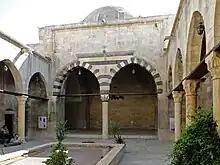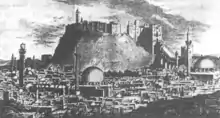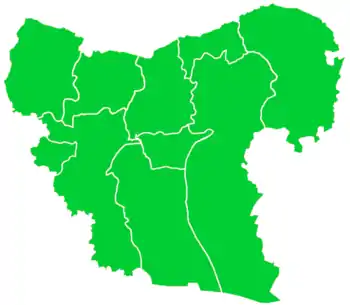The following is a timeline of the history of the city of Aleppo, Syria.
Prior to 10th century
| History of Syria |
|---|
.jpg.webp) |
| Prehistory |
| Bronze Age |
| Antiquity |
| Middle Ages |
|
| Early modern |
|
| Modern |
|
| Related articles |
| Timeline |
|
|
- Founded before 2000 BCE
- 1800–1525 BCE – part of the Amorite dynasty
- 333 BCE – Alexander the Great in power.
- 286 BCE – Hellenic settlement of Beroea established.
- 88 BCE – City becomes part of Kingdom of Armenia.
- 64 BCE – City becomes part of Roman Syria.
- 611 CE – Persian Chosroes II in power.[1]
- 637
- July–October: Siege of Aleppo by Muslim forces.
- Al-Shuaibiyah Mosque built.
- 717 – Great Mosque built.
10th–12th centuries
- 944 – Sayf al-Dawla in power.
- 962 – City sacked by the Byzantines.[2]
- 1086 - Aleppo submit to the rule of Malik-Shah, the Turkish ruler of the Seljuk Empire[3]
- 1090 – Seljuks in power.[1]
- 1124 – City besieged by Christian crusaders under Baldwin II of Jerusalem.[4]
- 1124 – Al-Halawiyah Madrasa built.
- 1138 – 11 October: Earthquake was one of deadliest of all time.
- 1168 – Al-Muqaddamiyah Madrasa established.
- 1170 – 29 June: Earthquake.[4]
- 1183 – Saladin assumes power.[1]
- 1193
- Az-Zahir Ghazi in power.
- Al-Shadbakhtiyah Madrasa built.
13th century
- 1211 – Hammam al-Sultan built.
- 1212 – Bab al-Nasr (gate) rebuilt.
- 1218 – Aqueduct restored.[4]
- 1223 – Al-Sultaniyah Madrasa established.
- 1230 – Bab al-Maqam (gate) built.
- 1236 – Al-Firdaws Madrasa established.
- 1237
- Khanqah al-Farafira (monastery) and Al-Kameliyah Madrasa built.
- Bab al-Nairab (gate) built (approximate date).
- 1242 – Al-Sharafiyah Madrasa built.
- 1251 – Al-Turantaiyah Madrasa built.
- 1256 – Bab Qinnasrin (gate) rebuilt.
- 1260 – City besieged by Mongol forces under Hulagu Khan.[2]
- 1280 – City besieged by Mongol forces.[2]
14th–15th centuries

Bimaristan Arghun al-Kamili, 1354
- 1303 – Mahmandar Mosque built.
- 1318 – Altun Bogha Mosque built.
- 1350 – Al-Sahibiyah Mosque built.
- 1354 – Bimaristan Arghun al-Kamili (asylum) active.
- 1398 – Al-Otrush Mosque and Al-Tawashi mosque built.
- 1400 – City sacked by forces of Timur of Transoxia.[2]
- 1427 – Citadel expanded.[2]
- 1418 – Central Synagogue rebuilt.
- 1425 – Al-Saffahiyah Mosque built.
- 1429 – Forty Martyrs Cathedral consecrated.
- 1450
- Khan al-Qadi active in Al-Madina Souq.
- Hammam al-Bayadah built.
- 1472 – Khan al-Burghul built in Al-Madina Souq.
- 1491 – Hammam Yalbugha built.
- 1500
- Cathedral of Our Lady of Syrians built.
- Church of the Dormition of Our Lady renovated.
16th century
- 1509 – Bab al-Hadid (gate) rebuilt.
- 1516 – Ottoman Selim I in power.[2]
- 1517 – Becomes part of Ottoman Empire.
- 1534 – City becomes capital of Aleppo Eyalet.
- 1537 – Population: 80,000.[5]
- 1539 – Souq Khan al-Nahhaseen built in Al-Madina Souq.
- 1546 – Khan al-Shouneh built in Al-Madina Souq.
- 1547 – Khusruwiyah Mosque built.
- 1548 – Consulate of Republic of Venice established.[6]
- 1557 – Al-Adiliyah Mosque built (approximate date).
- 1562 – Consulate of France established.[6]
- 1583 – Consulate of England established.[6]
17th–18th centuries

Aleppo, 1754
- 1603 – Beit Wakil (mansion) built.
- 1622 – Levant Company in business.[7]
- 1613 – Consulate of the Netherlands established.[6]
- 1629 – Guild of "makers of swords, knives, daggers, bows, and shields" organized.[8]
- 1682 - Souq Khan al-Wazir built in Al-Madina Souq.
- 1683 - Population: 115,000.[5]
- 1706 - Printing press established.[9]
- 1724 – Al-Ahmadiyah Madrasa established.
- 1730 – Madrasa Ridaiya established.
19th century
- 1805 – Uprising.[1]
- 1812 – Earthquake;[10] citadel collapses.[11]
- 1814 – "Janissary massacre."[1]
- 1822 – Earthquake.[4]
- 1823
- 1827 – Plague.[13]
- 1830 – Earthquake.[2]
- 1832
- Ibrahim Pasha takes city for Muhammad Ali of Egypt.
- Cholera outbreak.[13]
- 1834 – Military barracks built in the Citadel.
- 1840 – Mohammed Ali relinquishes power.
- 1850
- City besieged by Beduins.[2]
- Massacre of Aleppo (1850).
- 1853 – Pogrom of Jews.
- 1858 – Population: 70,000 (approximate).[4]
- 1859 – Terre-Sainte College opens.
- 1864 – City becomes capital of Aleppo Vilayet.
- 1868 – Municipal council formed.
- 1873 – Saint Elias Cathedral built.
- 1875 – Pogrom of Jews.
- 1878 – Population: 95,000 (approximate).[2]
- 1885 – Aleppo chamber of commerce founded.
- 1892 – Thanawiyyat al-Ma'mun (school) opens.[14]
- 1899 - Bab al-Faraj Clock Tower built.
20th century

Aleppo Nestlé building; Tilel street 1920s, postcard by Wattar Brothers
- 1901 – Ades Synagogue established.
- 1906 – Hama-Aleppo railway in operation.[15]
- 1909 – Abd al-Wahab al-Inklizi becomes mayor.[16]
- 1910
- 1911 – Baron Hotel in business.
- 1912 – Baghdad Railway in operation.[6]
- 1916 – Aleppo College established.
- 1918 – Ihsan al-Jabiri becomes mayor.[16]
- 1920 - Syria mandated to the French; city becomes capital of State of Aleppo.
- 1922 - Red Hand Society organized (approximate date).[16]
- 1924
- 1925 – Al-Yarmouk Sporting Club formed.
- 1927 – al-Hadith journal begins publication.[19]
- 1931 - National Museum of Aleppo founded.
- 1933 - Grand Serail d'Alep opens.
- 1936 - al-Nazir newspaper begins publication.[20]
- 1945
- National Library of Aleppo and Club d'Alep open.
- 1947 - Pogrom of Jews.
- 1948
- People's Party established.
- Al-Baladi Stadium opens.
- 1949
- Aleppo Public Park created.
- Al-Ittihad Sports Club and Jalaa FC formed.
- 1950
- Population: 362,500.
- al-Nass newspaper begins publication (approximate date).[16]
- 1952 – Hurriya Sporting Club formed.
- 1958 – University of Aleppo established.
- 1963 – Nasserist insurgency.
- 1964 – Population: 547,030 (estimate).[21]
- 1965 – Chemins de Fer Syriens headquartered in city.
- 1970
- Our Lady of Assumption church opens.
- Population: 639,428.[22]
- 1971 – Statue of Qustaki al-Himsi erected in Liberty Square.
- 1975 – Popular Traditions Museum opens in Beit Achiqbash.
- 1977 – International School of Aleppo established.
- 1979 – Aleppo Artillery School massacre took place by Muslim Brotherhood.
- 1980 – Siege of Aleppo.
- 1983 – International Center for Agricultural Research in the Dry Areas seed bank founded.
- 1985 – Population: 1,145,117 (estimate).[23]
- 1986 – Al-Hamadaniah Stadium opens.
- 1990 – Population: 1,216,000.
- 1994
- Aleppo Citadel Museum opens.
- Population: 1,542,000 (estimate).[24]
- 1997 – Lycée Français d'Alep established.
21st century
- 2002 – Private University of Science and Arts established.
- 2004 – Population: 2,132,100.
- 2006 – City designated an Islamic Capital of Culture.[25]
- 2007 – Aleppo International Stadium opens.
- 2008
- Sabah Fakhri Institute of music opened.[26]
- Population: 4,450,000 (estimate).[27]
- 2012
- 10 February: Bombings.[28]
- 18 March: Bombing.
- 4 May: Protest and crackdown.[28]
- 19 July: Battle of Aleppo begins.
- 9 September: Bombing near the 7 April Stadium.
- 3 October: Bombing in Saadallah Al-Jabiri Square.
- 2013
- 15 January: Aleppo University bombings.
- 19 March: Chemical weapon attack by militants.
- 2016
- 22 December: Battle of Aleppo ends.[29]
- 2020
- 16 February: Syrian Armed Forces recapture the entire city of Aleppo.[30][31]
See also
- History of Aleppo
- Ancient City of Aleppo
- List of churches in Aleppo
- List of mosques in Aleppo
- List of rulers of Aleppo
- Timelines of other cities in Syria: Damascus, Hama, Homs, Latakia
References
- 1 2 3 4 5 6 7 Britannica 1910.
- 1 2 3 4 5 6 7 8 9 Baedeker 1876.
- ↑ Richards 2002.
- 1 2 3 4 5 Murray 1858.
- 1 2 Raymond 1984.
- 1 2 3 4 5 Bosworth 2007.
- ↑ Blackwood 1916.
- ↑ Abdul-Karim Rafeq (2008). "Economic Organization of Cities in Ottoman Syria". In Peter Sluglett (ed.). Urban Social History of the Middle East, 1750–1950. NY: Syracuse University Press. ISBN 9780815631941.
- ↑ Henri Bouchot (1890). "Topographical index of the principal towns where early printing presses were established". In H. Grevel (ed.). The book: its printers, illustrators, and binders, from Gutenberg to the present time. H. Grevel & Co.
- ↑ History of Dates, J.M. Dent, London, 1954
- ↑ "A history of cities in 50 buildings", The Guardian, UK, 2015
- ↑ Morse 1823.
- 1 2 Chambers 1901.
- ↑ Keith David Watenpaugh (2006), Being modern in the Middle East, Princeton, NJ: Princeton University Press, ISBN 9780691121697, 0691121699
- ↑ Lewis R. Freeman (1915). "Railway Lines of Syria and Palestine". Railway Age Gazette.
- 1 2 3 4 Sami Moubayed (2006), Steel & Silk, Seattle, USA: Cune Press, ISBN 9781885942401
- ↑ Keith David Watenpaugh (2012), "Being middle class and being Arab: sectarian dilemmas and middle-class modernity in the Arab Middle East, 1908-1936", in A. Ricardo López (ed.), The making of the middle class, Durham: Duke University Press, ISBN 9780822351177
- ↑ Arnold H. Green (1988). "The History of Libraries in the Arab World: A Diffusionist Model". Libraries & Culture. 23 (4): 454–473. JSTOR 25542092.
- ↑ Encyclopedia of Arabic Literature. Taylor & Francis. 1998. ISBN 9780415185714.
- ↑ Keith D. Watenpaugh (2003). "Middle-Class Modernity and the Persistence of the Politics of Notables in Inter-War Syria". International Journal of Middle East Studies. 35 (2): 257–286. doi:10.1017/S0020743803000114. JSTOR 3879620. S2CID 155020440.
- ↑ "Population of capital cities and cities of 100,000 and more inhabitants". Demographic Yearbook 1965. New York: Statistical Office of the United Nations. 1966. pp. 140–161.
- ↑ United Nations Department of Economic and Social Affairs, Statistical Office (1976). "Population of capital city and cities of 100,000 and more inhabitants". Demographic Yearbook 1975. New York. pp. 253–279.
{{cite book}}: CS1 maint: location missing publisher (link) - ↑ United Nations Department of Economic and Social Affairs, Statistical Office (1987). "Population of capital cities and cities of 100,000 and more inhabitants". 1985 Demographic Yearbook. New York. pp. 247–289.
{{cite book}}: CS1 maint: location missing publisher (link) - ↑ United Nations Department for Economic and Social Information and Policy Analysis, Statistics Division (1997). "Population of capital cities and cities of 100,000 and more inhabitants". 1995 Demographic Yearbook. New York. pp. 262–321.
{{cite book}}:|author=has generic name (help)CS1 maint: location missing publisher (link) - ↑ "Capitals of Islamic Culture". Morocco: Islamic Educational, Scientific and Cultural Organization. Retrieved 21 January 2013.
- ↑ Karin van Nieuwkerk (2011), Muslim rap, halal soaps, and revolutionary theater: artistic developments in the Muslim world, Austin, Tex: University of Texas Press, ISBN 9780292726819
- ↑ "Table 8 - Population of capital cities and cities of 100,000 or more inhabitants", Demographic Yearbook – 2018, United Nations
- 1 2 Encyclopædia Britannica Book of the Year. Encyclopaedia Britannica. 2013. ISBN 978-1-62513-103-4.
- ↑ "Syrian army announces victory in Aleppo in boost for Assad". Huffington Post. Reuters. 2 January 2017.
- ↑ "Assad vows to defeat rebels, as forces capture new ground". AP NEWS. 16 February 2020. Retrieved 16 February 2020.
- ↑ News Desk (16 February 2020). "Battle of Aleppo city ends in Syrian Army victory after 7+ years of fighting". AMN - Al-Masdar News | المصدر نيوز. Archived from the original on 16 February 2020. Retrieved 16 February 2020.
Bibliography
- Published in 18th–19th century
- Alexander Russell (1756), "Description of the City of Aleppo", The Natural History of Aleppo, and Parts Adjacent, London: Printed for A. Millar, OCLC 13595445
- H. A. S. Dearborn (1819), "Aleppo", A Memoir on the Commerce and Navigation of the Black Sea, Boston: Wells & Lilly
- Jedidiah Morse; Richard C. Morse (1823), "Aleppo", New Universal Gazetteer (4th ed.), New Haven: S. Converse
- Henry Teonge (1825), "('Description of this cytty of Aleppo'...)", The Diary of Henry Teonge, chaplain on board His Majesty's ships Assistance, Bristol, and Royal Oak, anno 1675 to 1679, London: Charles Knight
- Josiah Conder (1834), "Aleppo", Dictionary of Geography, Ancient and Modern, London: T. Tegg
- John MacGregor (1844). "Trade of Aleppo". Commercial Statistics. London: C. Knight and Co. hdl:2027/nyp.33433024596516.
- "Aleppo", Handbook for Travellers in Syria and Palestine, London: J. Murray, 1858, OCLC 2300777
- J. Willoughby Rosse (1858). "Aleppo". Index of Dates ... Facts in the Chronology and History of the World. London: H.G. Bohn. hdl:2027/uva.x030807786 – via Hathi Trust.
- "Aleppo", Palestine and Syria, Leipsig: Karl Baedeker, 1876 (+ 1898 ed. and 1912 ed.)
- Published in 20th century
- "Aleppo", Chambers's Encyclopaedia, London: W. & R. Chambers, 1901
- . Encyclopædia Britannica. Vol. 1 (11th ed.). 1910. p. 541.
- W.J.C. (1916). "Aleppo". Blackwood's Magazine. 200: 179–190. hdl:2027/uc1.b2927384.
- Ralph Davis, Aleppo and Devonshire Square English Traders in the Levant in the Eighteenth Century (1967) Macmillan
- Hector William Dinning (1920), "Aleppo", Nile to Aleppo, London: G. Allen & Unwin
- Andre Raymond (1984). "Population of Aleppo in the Sixteenth and Seventeenth Centuries according to Ottoman Census Documents". International Journal of Middle East Studies. 16 (4): 447–460. doi:10.1017/S002074380002849X. JSTOR 163151. S2CID 162113165.
- Yasser Tabbaa. "Circles of Power: Palace, Citadel, and City in Ayyubid Aleppo." Ars Orientalis 23 (1993): 181–200.
- Noelle Watson, ed. (1996). "Aleppo, Syria". International Dictionary of Historic Places: Middle East and Africa. UK: Routledge. ISBN 1884964036.
- Published in 21st century
- David Dean Commins (2004). "Aleppo". Historical Dictionary of Syria. Scarecrow Press. ISBN 978-0-8108-4934-1.
- Josef W. Meri, ed. (2006). "Aleppo". Medieval Islamic Civilization. Routledge. p. 27. ISBN 978-0-415-96691-7.
- C. Edmund Bosworth, ed. (2007). "Aleppo". Historic Cities of the Islamic World. Leiden: Koninklijke Brill. p. 6. ISBN 978-9004153882.
- Jean-Claude David (2008). "Aleppo: from the Ottoman Metropolis to the Syrian City". In Salma K. Jayyusi; et al. (eds.). The City in the Islamic World. Leiden: Koninklijke Brill. pp. 329–356. ISBN 9789004162402.
- Gabor Agoston; Bruce Alan Masters (2009). "Aleppo". Encyclopedia of the Ottoman Empire. Facts on File. p. 30. ISBN 978-1-4381-1025-7.
- Nora Lafi, "Building and Destroying Authenticity in Aleppo: Heritage between Conservation, Transformation, Destruction, and Re-Invention" in Christoph Bernhardt, Martin Sabrow, Achim Saupe (eds.)., Gebaute Geschichte. Historische Authentizität im Stadtraum, Göttingen, Wallstein, 2017, pp. 206–228.
- [1]
- Winter, Stefan; Ade, Mafalda, eds. (2019). Aleppo and its Hinterland in the Ottoman Period / Alep et sa province à l'époque ottomane. Brill. ISBN 978-90-04-37902-2.
External links
Wikimedia Commons has media related to History of Aleppo.
- Michel Ecochard. "Aleppo Album". Regional Surveys. ArchNet. 1930s–1940s
- ArchNet. "Aleppo". Archived from the original on 30 October 2013.
- Europeana. Items related to Aleppo
- Digital Public Library of America. Items related to Aleppo
- Laura Kurgan (ed.). "Conflict Urbanism: Aleppo". New York: Columbia University, Center for Spatial Research.
Map of Aleppo...before and during the current civil war
2016–
36°13′N 37°10′E / 36.217°N 37.167°E
This article is issued from Wikipedia. The text is licensed under Creative Commons - Attribution - Sharealike. Additional terms may apply for the media files.

